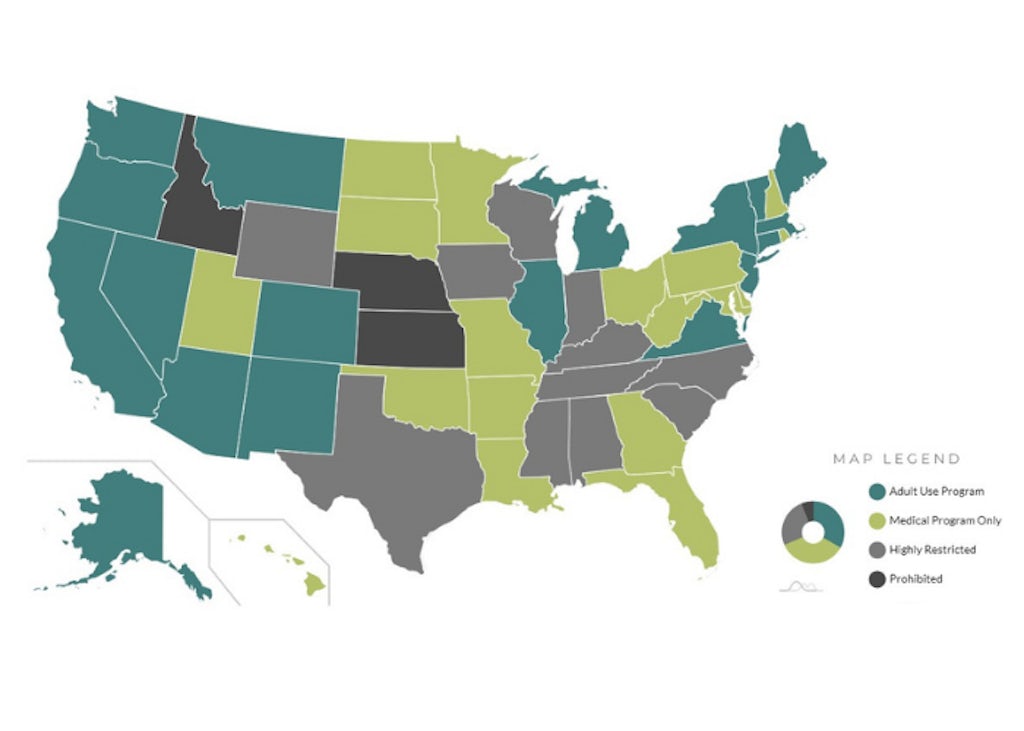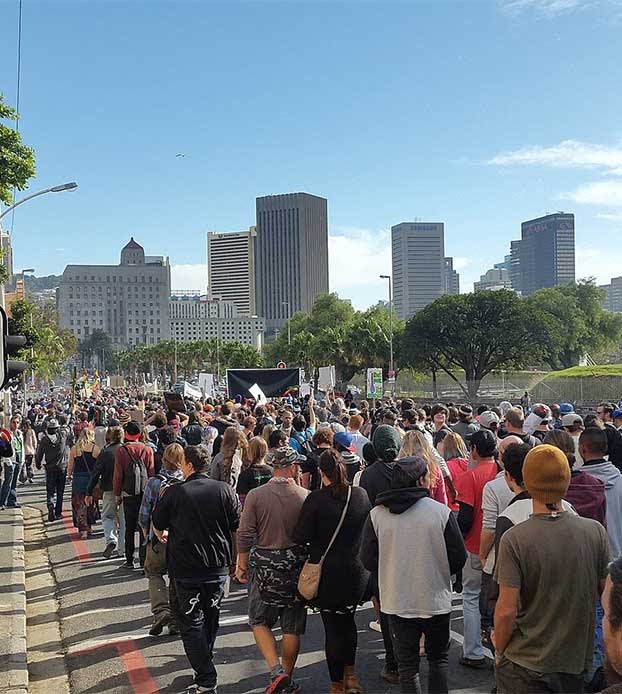The US cannabis industry has an equality problem.
It’s not a new problem, nor a problem limited to cannabis. Yet it is one that cannabis is uniquely positioned, and failing, to address.
The War on Drugs had a massive, disproportionate impact on communities of color. And now that legalization is sweeping the country, the cannabis industry is particularly good at continuing to exclude Black, Latino, Indigenous, and other communities of color.
This is not new information, but for the first time, a comprehensive report details the exact state of social equity in the cannabis industry – or fundamental lack thereof.
The Minority Cannabis Business Association (MCBA) recently released the first National Cannabis Equity Report, a 39-page document that explores the social equity programs within the 36 states that have legalized medicinal or recreational cannabis.
More than 33% of Americans live where cannabis is legal, but Black people are still six times more likely to be incarcerated for drug offenses, including cannabis, according to the report. Despite 36 states with legal marijuana, less than 2% of cannabis businesses are owned by Black people. Of these states, only 15 even have specific social equity programs within their legalization framework.
The report displays a vast disconnect between the commitment to the goal of equality and the execution needed to achieve it.
“There is an incredible disconnect between what people think cannabis equity programs do and what they actually do. We compiled quantitative data to better understand barriers to entry and sustainability in legal cannabis markets,” Amber Littlejohn, Executive Director of the MCBA, told The Cannigma. “We want the Report and the Map to serve as tools for advocats, lawmakers, and industry to provide real solutions to the cannabis equity problem.”
The four pillars of equity
To judge the effectiveness of social equity programs, it helps to have a concrete definition of what you’re looking for.
The MCBA spelled out four pillars that constitute a truly equitable program.
- Equitable industry: promotes the inclusion of minorities through equal access to opportunities and resources.
- Equitable communities: empower communities most impacted by the War on Drugs through reinvestment, corporate responsibility initiatives, and social programming.
- Equitable justice: reduces imprisonment for non-violent cannabis offenses and restores basic rights of citizenship to individuals with said offenses.
- Equitable access: ensures safe legal products are available to immigrants, veterans, seniors, and disabled persons without risk of loss of benefits or status.
The MCBA findings: a summary
Execution of programs doesn’t reflect commitment to equity
Though social equity is often cited as a reason for cannabis legalization, it is not prioritized in creating the market.
The first medical cannabis market opened in 1996, but the first social equity program in the medical market wasn’t created until 2016 – a 20-year gap. There were eight years between the first state to legalize recreational cannabis and the first state to include a social equity program in their legalization.
Of the 36 states with legal medicinal or recreational cannabis today, only 15 have specifical social equity programs. Thirteen of these are in recreational states and two in medicinal states.
None of these states have created a truly equitable market across the four pillars of equality, as defined by the MCBA.
Use of non-race criteria has not created diverse markets
The prohibition of cannabis was rooted in racism, and the report’s authors stress that race-based solutions are necessary to create a truly equitable playing field.
Yet of the 15 equity programs, only three use race-based criteria in social equity qualifications.
Instead, 14 states use residency or location-based criteria to try to reach communities disproportionately affected by the War on Drugs.
State-level license caps lead to lack of diversity
License caps are a maximum number of licenses the state will issue for cannabis businesses. Some 26 out of 36 legal states have license caps, but only nine of these states also have a social equity program.
License caps are not based on any economic data, but rather artificially inflate the value of licenses by inflaming competition. Many states use market caps to prevent market saturation in theory, but in execution, these caps can cause lawsuits, delaying social equity implementation and increasing the application cost.
Seven out of the nine states with license caps and equity programs designate a certain percentage or number of licenses for social equity applicants. But it is still costly to apply for a license, and only two states provide license exclusivity for minority business owners.
These license caps also fail to account for the competition from the legacy market and do not provide a pathway for these businesses to transition into the legal market.
Social equity funding is rare and poorly executed
Entering the cannabis industry is expensive with fees for license applications reaching over $100,000 in some states. This is problematic for social equity applicants, who face economic and wealth disparities from their white counterparts as a direct result of the War on Drugs.
Many of the programs offer cost waivers and fee reductions, but only six of the 15 equity programs offer some form of funding. This money is distributed in the form of grants, micro-loans, and low to no-interest loans. However, most of this money comes from revenue generated from the adult-use market, meaning other businesses must be up and running before social equity applicants can even apply.
The average Black or Latino household earns about half as much as the average White household with a fraction of the net wealth. Yet only five states consider income levels in their social equity criteria while 16 states require proof of capital for issuing licenses. This means an applicant must show funds secured prior to getting a license, which ranges from $100,000 to $2 million dollars.
Real estate requirements present a significant barrier to entry
In addition to the start-up and application costs, most states also require applicants to have real estate to operate out of, before they can get a license.
A whopping 22 out of 36 states require proof of premise, which includes a lease or valid deed. This can spell huge additional costs for social equity applicants, who must make payments on the property for months without knowing if or when they’ll be able to operate out of it.
Felony conviction bans remain
In a particularly insidious move, most states ban people with felony convictions from owning or investing in a cannabis business, barring them from re-entering the industry they went to jail for.
- 35 medical programs ban awarding licenses to people with felony convictions.
- Only four make an exemption of cannabis
- 14 out of 18 recreational programs ban awarding licenses to people with felony convictions.
- Only nine states make an exemption for cannabis
- 34 states ban people with felonies from owning or investing in a medical cannabis company.
- 34 states require background checks and allow people with felony convictions to be denied employment.
Inequitable medical markets create inequitable adult-use markets
Medical cannabis is often used as a pathway to recreational use, so if there are existing inequalities in the medical markets, these are continued and expanded in the legal market.
Medical businesses often have advantages in entering the adult-use market, including early access to licensing and the ability to host another dispensary on-site. Medical cannabis companies are required to be vertically integrated in 13 states (controlling the plant from seed to sale), which can give them a financial and production advantage for recreational.
What does this mean for the cannabis industry?
This report is a no-holds-barred look at the state of the cannabis industry, and what it finds can be disheartening. But the report was released with a toolkit for businesses and people who want to enact change.
The MCBA also released the Equity Map, a digital tool that tracks existing and proposed cannabis laws with the hope that people will use this as a framework to create more equitable programs moving forward. Through its four pillars of equity, the MCBA spells out what a truly equitable program looks like and offers goalposts to measure programs and the industry.
Though this report is not shy about naming multi-state operators (MSO) as perpetrators of inequitable practices, it is also not cause to write the businesses off entirely. The report is sponsored by Parallel, an MSO.
Parallel’s backing of the report came as it shifted focus onto creating a more equitable industry, something it admits hasn’t been a priority. New CEO James Whitcomb published an open letter to the cannabis industry on February 15, publicly apologizing for Parallel’s part in furthering inequity, calling out other MSOs for advocating for exclusionary policies, and pledging to use the MCBA’s toolkit to create meaningful change.
“Parallel showed incredible leadership stepping out in support of the Report and the findings. We won’t see real change unless MSOs are willing to follow their lead and work to address systemic inequities created by overly zealous efforts to secure market share without regard for the impacts on equity, ” said Littlejohn. “This is a situation created by Big Cannabis and Big Cannabis should be leading the charge to fix it.”
A statement like Whitcomb’s is unparalleled in the cannabis industry and yet it signals that change is possible at all levels. Cannabis has a unique opportunity to right historical wrongs, bring economic empowerment to communities, and create a more just society for everyone.
Sign up for bi-weekly updates, packed full of cannabis education, recipes, and tips. Your inbox will love it.

 Shop
Shop Support
Support


















